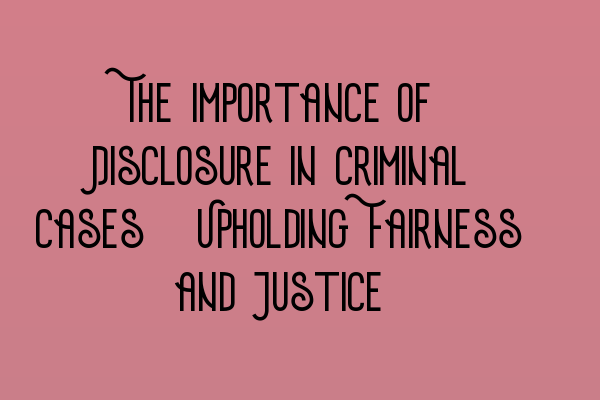The Importance of Disclosure in Criminal Cases: Upholding Fairness and Justice
In any criminal case, the principle of disclosure plays a vital role in upholding fairness and justice. Disclosure refers to the process by which the prosecution shares information with the defense in order to ensure a fair trial. This information includes evidence in the possession of the prosecution that is favorable to the defense, as well as any other material that is relevant to the case.
The importance of disclosure cannot be overstated. It is a fundamental aspect of the criminal justice system in the UK, ensuring that defendants are aware of all the evidence against them and enabling them to prepare a proper defense. The failure to properly disclose relevant material can lead to wrongful convictions and miscarriages of justice.
One of the key reasons why disclosure is crucial is that it allows the defense to effectively challenge the credibility and reliability of the prosecution’s case. Without access to all the relevant information, it would be significantly more difficult for defendants to contest the evidence against them. This could potentially lead to wrongful convictions, as crucial evidence may be overlooked or not given the necessary scrutiny.
Furthermore, the principle of disclosure promotes transparency in the criminal justice system. By ensuring that both the prosecution and the defense have access to the same information, it helps create a level playing field and reduces the risk of an unfair trial. This transparency is essential for maintaining public trust and confidence in the criminal justice system.
Disclosure and the Role of the Solicitor:
As a solicitor representing a client in a criminal case, it is your responsibility to ensure that the principle of disclosure is upheld. You play a crucial role in obtaining all relevant evidence from the prosecution and ensuring that it is properly disclosed to the defense.
This process involves thorough investigation, analysis, and understanding of the case details. It is necessary to identify potential sources of evidence and make specific requests for disclosure to the prosecution. This includes not only evidence that supports the defense’s case but also evidence that may undermine the prosecution’s case.
In order to effectively navigate the disclosure process, it is important to have a deep understanding of the law surrounding disclosure requirements and the relevant legal precedents. This expertise will enable you to identify any deficiencies in the prosecution’s disclosure and take the necessary steps to address them, such as making applications to the court for further disclosure.
SEO Integration:
For more information regarding legal representation for Delaware LLCs in the UK, you can refer to the article Legal Representation for Delaware LLCs in the UK: Expert Advice.
If you would like to learn about ethical business practices in Delaware, you can read the article Ensuring Ethical Business Practices: Delaware’s Code of Conduct.
For UK businesses facing legal challenges in the U.S., strategies for overcoming hurdles are discussed in the article Legal Challenges for UK Businesses in the U.S.: Strategies for Overcoming Hurdles.
To gain a more in-depth understanding of UK criminal law and the British legal system, you can refer to the article UK Criminal Law: An In-Depth Analysis of the British Legal System.
If you are interested in further exploring the challenges faced by UK businesses in the U.S. and strategies for overcoming them, you can find valuable insights in the article Legal Challenges for UK Businesses in the U.S.: Strategies for Overcoming Hurdles.
In conclusion, the importance of disclosure in criminal cases cannot be emphasized enough. It is a critical factor in ensuring fairness and justice, as it allows the defense to properly challenge the prosecution’s case and ensures transparency in the criminal justice system. As a solicitor, it is essential to uphold the principle of disclosure and diligently navigate the disclosure process to protect the rights of your clients and contribute to the overall integrity of the criminal justice system.
